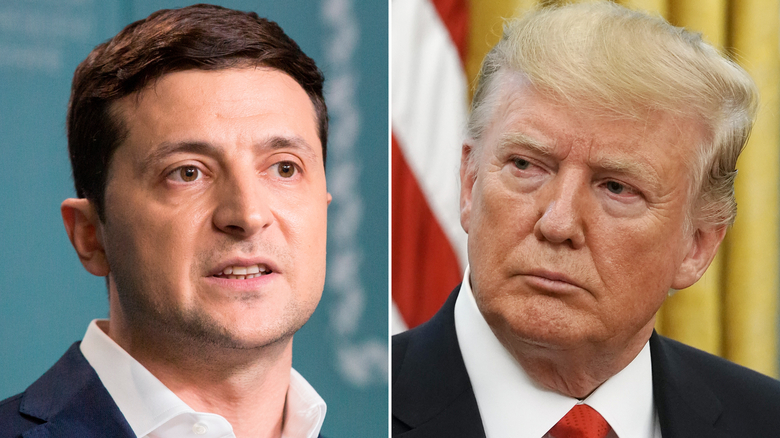The whistleblower complaint at the heart of a controversy over President Trump and Ukraine alleges that Trump used “the power of his office to solicit interference from a foreign country in the 2020 election,” and that Rudy Giuliani and Attorney General Bill Barr appeared to be involved in the effort as well.
The Trump administration’s initial refusal to turn over the complaint is what led to House Speaker Nancy Pelosi’s watershed decision on Tuesday to finally support a formal impeachment inquiry.
Likely as a result of pressure from that announcement, the administration released both the complaint and, earlier in the day, a summary of Trump’s July phone call with Ukrainian President Volodymyr Zelensky.
The whistleblower breaks down the alleged actions — which they said they believe “pose risks to the U.S. national security and undermine the U.S. government’s efforts to deter and counter foreign interference in U.S. elections” — into 4 sections.
1. The July 25 presidential phone call: Multiple White House officials told the whistleblower that they were “deeply disturbed” by what transpired in the phone call between Ukrainian President Volodymyr Zelensky and President Trump, in which Trump “sought to pressure the Ukrainian leader to take actions to help the President’s 2020 reelection bid.”
2. Efforts to restrict access to records related to the call: The whistleblower said that in the days after the call, White House officials “intervened to ‘lock down’ all records of the call, especially the word-for-word transcript.” White House lawyers directed officials to load the electronic transcript onto a separate system that is generally used to handle classified information, despite there being no national security-sensitive material on the phone call.
A footnote states that this was not the first time that the Trump administration had used the system “for the purpose of protecting politically sensitive — rather than national security sensitive — information.”
3. Ongoing concerns: A day after the call, the whistleblower said that U.S. envoy to Ukraine Kurt Volker and U.S. Ambassador to the EU Gordon Sondland met with Ukrainian officials and provided them with advice on how to “navigate” Trump’s demands. Trump’s lawyer Rudy Giuliani also traveled to Madrid to meet with a Zelensky adviser and reached out to several other Ukrainian officials as a “direct follow-up” to the call.
4. Circumstances leading up to the 25 July Presidential phone call: In the most extensive section of the complaint, the whistleblower details how Ukraine’s Prosecutor General Yuriy Lutsenko made a series of corruption allegations in March 2019 against U.S. officials, including Joe Biden. The allegations were followed by news that Giuliani met on two occasions with Lutsenko and planned to travel to Ukraine in May to pursue investigations related to Trump’s 2020 reelection bid.
Multiple U.S. officials told the whistleblower that they were “deeply concerned by what they viewed as Mr. Giuliani’s circumvention of national security decisionmaking processes.”
Multiple U.S. officials also told the whistleblower that Ukrainian leadership was “led to believe” that a phone call or meeting between Trump and Zelensky would depend on whether Zelensky showed a willingness to “play ball” on the issues aired by Lutsenko and Giuliani.
In mid-July, the whistleblower learned that Trump had directed the Office of Management and Budget to suspend all U.S. security assistance to Ukraine. OMB officials were unaware of a policy rationale.
The whistleblower didn’t directly witness the events, but said the witness accounts were accurate “because, in almost all cases, multiple officials recounted fact patterns that were consistent with one another.”
Intelligence Community Inspector General Michael Atkinson also found the complaint to be credible.
You can read it in its entirety below.
Whistleblower Complaint
